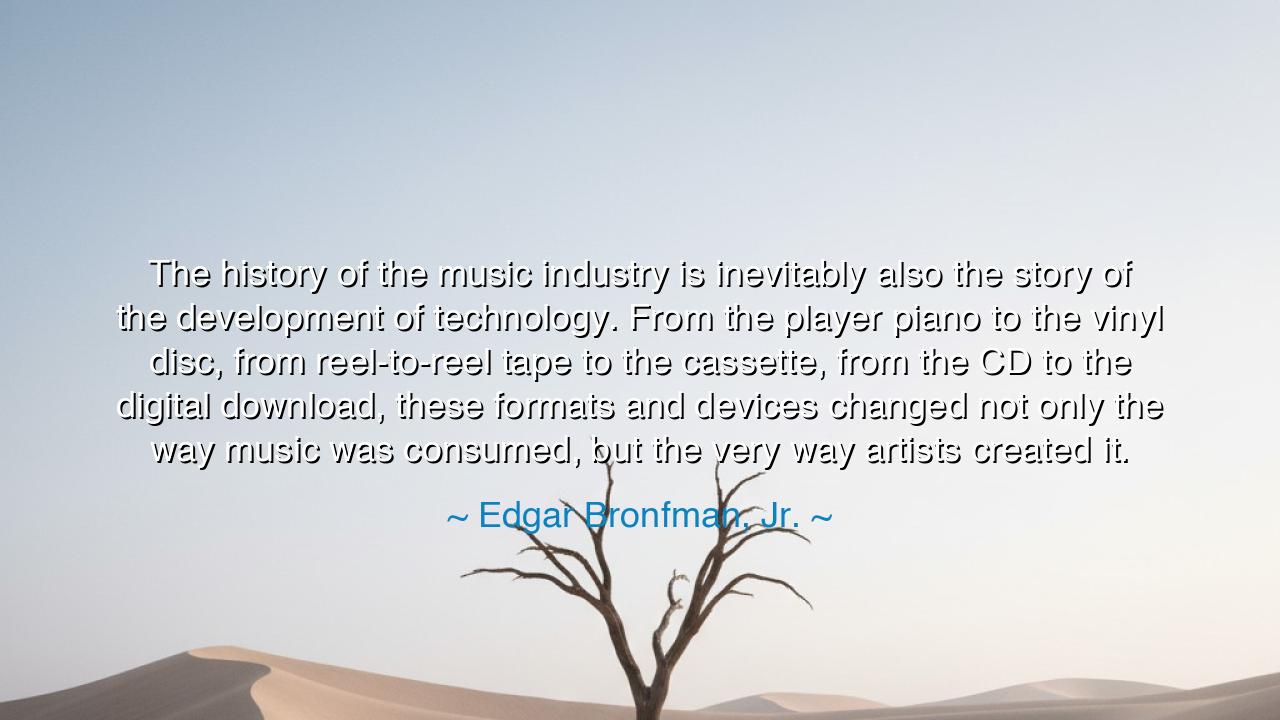
The history of the music industry is inevitably also the story
The history of the music industry is inevitably also the story of the development of technology. From the player piano to the vinyl disc, from reel-to-reel tape to the cassette, from the CD to the digital download, these formats and devices changed not only the way music was consumed, but the very way artists created it.






Edgar Bronfman, Jr., heir to both the world of commerce and the kingdom of music, once declared: “The history of the music industry is inevitably also the story of the development of technology. From the player piano to the vinyl disc, from reel-to-reel tape to the cassette, from the CD to the digital download, these formats and devices changed not only the way music was consumed, but the very way artists created it.” In this statement, he unveils a truth that reaches deep into the human story: that music and technology are entwined, shaping one another in their eternal dance.
From the very dawn of civilization, mankind has sought ways to capture and preserve sound. The beating of the drum, the carving of the flute, the chant by firelight—these were the first technologies of music, humble yet profound. But with each new invention, from the printing of sheet music to the invention of the phonograph, humanity gained not only a new way to hear songs but a new way to imagine them. Bronfman reminds us that each device—each player piano, each cassette, each CD—was more than a container of music; it was a doorway that changed how music was made, shared, and loved.
Consider the rise of the vinyl disc. When records first spun in the homes of ordinary people, the musician no longer played only for a small audience gathered in a hall. His song could travel across nations, his voice could reach millions. This was not merely distribution; it was transformation. Composers began to think in terms of albums, not single performances, crafting works designed to endure repeated listening. The technology of vinyl reshaped the very structure of art.
Or recall the humble cassette tape, small and portable. With it came the age of the mixtape, when lovers, friends, and dreamers could craft personal collections, weaving their own stories out of the songs of others. Musicians responded by writing shorter, catchier tracks fit for this intimate consumption. Entire cultures—hip hop among them—found new avenues of expression through this medium, for the cassette was cheap, accessible, and easily shared. Thus we see how each device reshapes not only the audience, but the artist’s creation.
The CD brought clarity, the polished sound of digital precision, and with it a new emphasis on production, arrangement, and studio perfection. Yet the digital download transformed music once again, breaking the album apart, allowing listeners to choose only the tracks they wished. Artists had to adapt, focusing more on singles, instant impact, and the demands of a global, impatient audience. What Bronfman teaches is that the artist does not create in isolation—he is shaped by the tools and the audiences that technology delivers to him.
This principle is not confined to music. The printing press changed the way men wrote books; the camera changed the way painters saw the world; the internet changes the way ideas themselves are born and spread. Technology is not neutral—it molds the very form of creativity, bending the imagination of mankind to its possibilities and its limits. Music is but one mirror of this eternal truth.
Therefore, O seekers, the lesson is this: honor both the art and the tool. Do not cling so tightly to the old forms that you despise the new, nor embrace the new so blindly that you forget the treasures of the old. Instead, walk with wisdom, using every technology as a servant of expression, not a master of it. And remember: though the player piano, the vinyl disc, the cassette, and the CD may fade, the human spirit that sings endures forever. Let technology guide the form, but let the soul of music—the eternal cry of humanity—remain your truest instrument.






AAdministratorAdministrator
Welcome, honored guests. Please leave a comment, we will respond soon